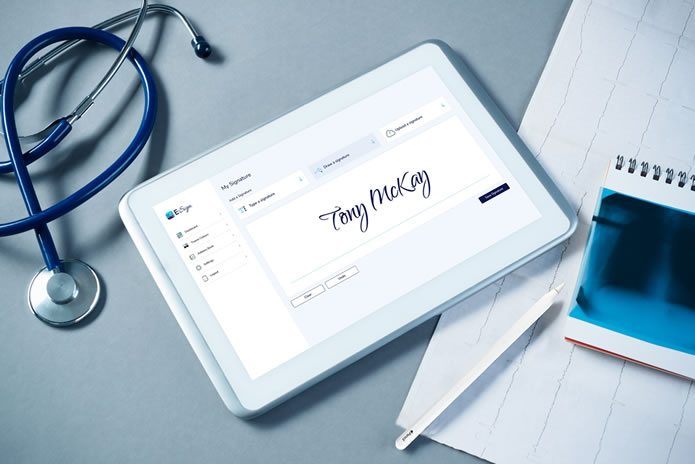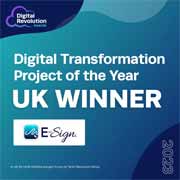
What is Leading Digital Transformation in Healthcare
3rd Jul, 2023
Digital transformation has become an integral part of many industries, and healthcare is no exception. The National Health Service (NHS) plays a vital role in providing quality healthcare to millions of people in the UK. Embracing digitalisation has proven to be a game-changer, enhancing efficiency, reducing costs, and improving patient care.
This blog will explore the benefits of digital transformation in the NHS, with a particular focus on the use of E-Signs electronic signatures and E-Signs e-consent. We will also highlight how the COVID-19 pandemic has accelerated the need for digitisation in healthcare, using our National Clinical Homecare Association (NCHA) case study as an example.
The NCHA is the trade body for the clinical homecare industry, representing the majority of organisations providing Clinical Homecare Services. Part of its remit is to agree to industry-wide positions and solutions that can help to improve clinical home care for patients. The NCHA had a requirement to harmonise prescription processing for patients in clinical home care.
The existing paper-based workflow often led to unnecessary delays in patients receiving appropriate care and medical treatment, especially those patients who were deemed to be at risk. The problems of dealing with physical documents had been exacerbated by staff working from home as a result of the COVID-19 pandemic. For example, there had been some high-profile cases of NHS prescriptions going ‘missing’.
The healthcare industry recognised the need to adopt E-Sign’s digital approach to prescription processing, giving operational advantages, regulatory compliance and improvements to patient safety. The NCHA put out a tender for a single, standardised digital solution that would work across all providers and hospitals, with minimum effort from the NHS.
What are the Benefits of Digitisation?
Digitisation within the National Health Service (NHS) offers numerous benefits that can enhance healthcare delivery, improve patient outcomes, and streamline administrative processes. Some key benefits of digitisation within the NHS, according to the E-Signs NCHA case study include:
- Improved efficiency: Prescription process time was reduced from 2 days to 2 hours (80% reduction) and staff also reported an improved audit log and reduction in delays due to multiple staff being assigned to prescriptions in case of absence
- Cost savings: £95,324.44 annual savings from kWh reduction (based on mailing)
- Carbon emission savings: 9,172kg CO2 equivalent reduction over 12 months (inclusive of paper, and envelopes), whilst 510 trees can work on reducing carbon dioxide emissions from other sources

Digital Transformation in the NHS: A Long-Term Plan
The NHS has recognised the importance of digital transformation and has outlined a comprehensive long-term plan to integrate technology into healthcare services. According to the NHS website, they aim to provide digital services and tools to give people more control over their health and the care they receive from the NHS. Examples being:
- Extend NHS App to everyone as a new digital ‘front door’, giving people secure digital access to their medical records; find trusted information about their health online; allow patients to conveniently book appointments and view test results online. In time it will also provide medical advice and consultations securely.
- Give health and care staff the technology they need to help them complete administrative tasks more quickly, freeing up time to spend with patients.
- Set standards that keep information secure and make sure NHS IT systems talk to each other to provide health and care staff with complete access to joined-up patient records.
In 10 years, they expect the existing model of care to look markedly different. The NHS will offer a ‘digital first’ option for most, allowing for longer and richer face-to-face consultations with clinicians where patients want or need it. Primary care and outpatient services will have changed to a model of tiered escalation depending on need. Senior clinicians will be supported by digital tools, freeing trainees’ time to learn.
When ill, people will be increasingly cared for in their own homes, with the option for their physiology to be effortlessly monitored by wearable devices. People will be helped to stay well, recognise important symptoms early, and to manage their health, guided by digital tools.
Electronic Signatures: Redefining the Prescription Process
One area where E-Sign’s digital transformation has yielded remarkable results is the prescription process. Traditionally, prescriptions involved cumbersome paperwork, manual signatures, and time-consuming processes. However, with the implementation of E-Sign’s electronic signatures, the prescription process has been completely revolutionised.
Our case study demonstrates the positive impact of E-Sign’s electronic signatures. By adopting digital solutions, the NCHA reduced the prescription process time from 2 days to just 2 hours, achieving an impressive 80% reduction. This transformation not only improves efficiency but also leads to substantial cost savings and environmental benefits.
Environmental Benefits: A Greener NHS
Digital transformation not only enhances efficiency but also contributes to environmental sustainability. The NCHA case study showcases a reduction of 9,172kg CO2 equivalent over 12 months by eliminating paper and envelopes. Additionally, the NHS saves £95,324.44 annually through a reduction in energy consumption, based on mailing.
Moreover, embracing digitalisation helps the NHS play a part in fighting climate change. The case study states that 510 trees can work on reducing carbon dioxide emissions from other sources. These remarkable environmental benefits emphasize the importance of digital transformation in creating a greener and more sustainable healthcare system.
 <
<COVID-19: Catalyst for Digital Transformation
The COVID-19 pandemic has highlighted the urgent need for digital transformation in healthcare. The demand for remote consultations, virtual care, and contactless processes skyrocketed during the crisis. The NHS had to adapt rapidly to meet these evolving needs, and digitalisation played a crucial role.
According to Nuffield Health, the Covid-19 pandemic resulted in the rapid adoption of digital technology in the NHS and significant changes in the delivery of services more widely – to free up space and capacity in acute hospitals, enable remote working and reduce the risk of infection transmission in NHS settings. Primary care in particular saw a huge increase in remote appointments.
There has also been a surge in patients’ uptake of remote health services, including registrations for the NHS App, NHS login and e-prescription services. With social distancing measures in place, electronic signatures and e-consent became essential tools for remote consultations, telemedicine, and digital health platforms. Patients could provide consent, sign documents, and access healthcare services from the comfort of their own homes. This not only reduced the risk of virus transmission but also improved access to care for vulnerable populations.
Improved Audit Trails and Staff Efficiency
In addition to the quantifiable benefits, digital transformation brings qualitative improvements to healthcare processes. With electronic signatures, an improved audit log ensures that all actions are recorded, enabling better transparency, accountability, and traceability. This not only enhances compliance but also facilitates easier audits and reduces potential errors or malpractices.
Furthermore, Digitalisation enables seamless collaboration and communication among healthcare professionals. Staff members can quickly access and review electronic documents, reducing delays and ensuring continuity of care, even in cases of absence or staff rotation. This enhanced efficiency leads to improved patient care and satisfaction.
Looking Ahead: A Digital Future for Healthcare
As the NHS continues its journey towards digital transformation, the benefits will extend far beyond electronic signatures and e-consent. The long-term plan outlined by the NHS emphasises the importance of harnessing technology to empower patients, improve data sharing, and enhance decision-making processes. By embracing innovation, the healthcare industry can optimise resource allocation, streamline workflows, and deliver personalised care to every patient.
Conclusion
The NHS is at the forefront of a digital revolution in healthcare, recognising the transformative power of technology. By leveraging digital tools such as electronic signatures, the NHS has achieved remarkable improvements in efficiency, cost savings, and patient care. The COVID-19 pandemic has further emphasised the need for digital transformation, as remote healthcare services became essential. With a long-term plan in place, the NHS is poised to create a future where digitalisation is at the core of delivering high-quality, accessible, and sustainable healthcare for all. The journey has just begun, and the possibilities are limitless.











